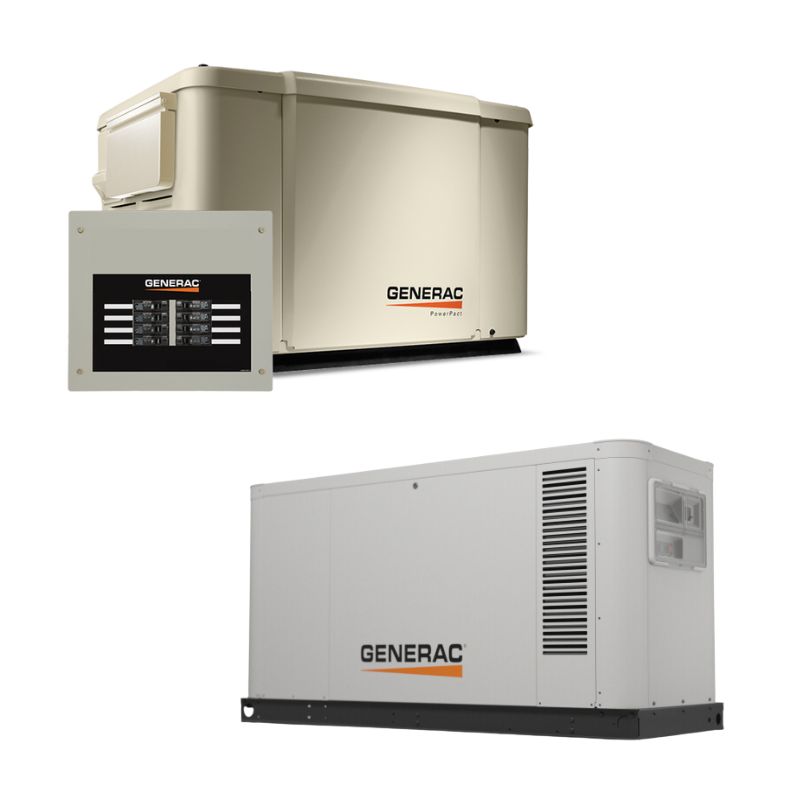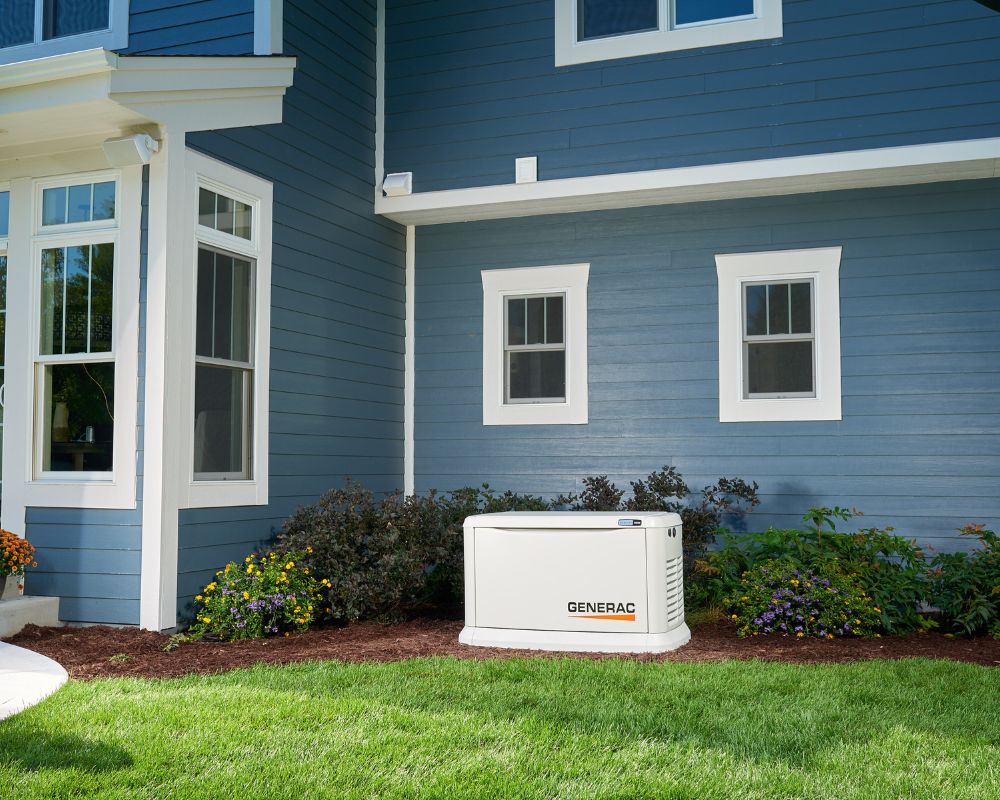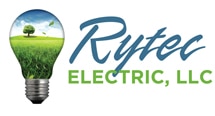What to Look For When Shopping for a Whole Home Generator
When the power goes out, a whole home generator can be more than just a convenience—it can be a lifeline. Whether you want your air conditioning to continue keeping you cool during summer blackouts or or ensuring life-saving medical equipment remains operational, the right entire-home generator makes all the difference.
But with so many options on the market, how do you choose the best backup generator for your home? In this article we will break down the key factors you should consider before making any purchases. Need some help deciding? A professional electrician will be able to walk you through the process and ensure you select the right generator for your home!

Choosing the Right Whole House Generator
Unlike portable generators, whole home generators are connected directly into your home’s power mains. This completely eliminates the need for extension cords or setting up a portable generator in the dark. When properly sized, a backup generator will power your entire house, letting you go about your life normally even while your neighborhood is without electricity.
Get The Right Size Generator for Your Power Needs
The first step in selecting a whole house generator is determining the right amount of power for your needs. Generator power output is measured in kilowatts (kW), and the size you need depends on the total power consumption of your home.
To get a rough estimate, make a list of all the appliances and systems you want to run during an outage and calculate their total wattage. The bulk of your home’s power demands are going to come from your HVAC, water heater, and space heaters, but it is important not to forget essential appliances like medical equipment, refrigerators, sump pumps, and well pumps.
It’s a good idea to consult with a professional electrician to consider factors like starting versus running wattage and to ensure your generator can handle your home’s peak load. This upfront planning saves you from underestimating your needs and ending up with insufficient power during critical times, or overestimating and purchasing more power capacity than you’ll need.
Selecting The Right Type of Fuel
When choosing a whole house generator you have a few fuel sources to consider: diesel, natural gas, and propane. Each has its own advantages and disadvantages, and here is a quick overview:
Diesel
Diesel generators are renowned for their efficiency and durability, and are often the go-to choice for commercial and industrial applications. They tend to have a longer lifespan and can run for long periods, making them suitable for areas prone to extended outages.
Diesel fuel is generally considered safer to store than other fuels due to its low flammability. However, diesel generators can be louder than their natural gas or propane counterparts. Additionally, the cost of diesel and the need to store it might be drawbacks for some homeowners.
Natural Gas
Natural gas generators are a popular choice for many homeowners, especially those with an existing natural gas line. These generators offer the convenience of a continuous fuel supply, eliminating the need for fuel storage.
They’re generally less expensive to run than their propane or diesel counterparts, although this depends on local gas prices. Natural gas generators are also known for producing fewer emissions, making them an environmentally friendly option. Keep in mind that installation costs for natural gas powered generators are often higher than propane and diesel generators due to the required natural gas line hookup.
Propane (AKA Liquid Propane or LP)
Propane-powered generators are an excellent alternative for homes without access to natural gas. Propane has a long shelf life, which means you can store large quantities without worrying about the fuel degrading over time.
While propane offers greater fuel density than natural gas, it comes up short when compared to diesel. This means that for a given sized fuel tank, a propane tank will run out faster than a diesel tank.

Features to Consider When Picking a
Standby Generator
Automatic Transfer Switch
An Automatic Transfer Switch (ATS) is essential for a seamless transition during power outages. This switch automatically detects a power loss, turns on the generator, and switches your home’s electrical load to the generator without any manual intervention.
When power returns, the ATS switches back and shuts off the generator. This feature not only adds convenience but also safety, preventing back-feed onto the local power grid, which can be dangerous to utility workers.
While manual transfer switches are available, we highly recommend that homeowners choose an automatic transfer switch for peace of mind and ease of use.
Long-term Reliability
Investing in a generator is a big decision, and you’ll want a unit that stands the test of time. Look for generators from reputable manufacturers like Generac or Cummins with a track record of reliability and durability.
Consider the warranty and service agreements, as these can be indicators of the manufacturer’s confidence in their product. Regular maintenance is also key to ensuring long-term reliability, so ease of access to service and parts should not be overlooked.
While manual transfer switches are available, we highly recommend that homeowners choose an automatic transfer switch for peace of mind and ease of use.
Noise Levels
Considering the generator will often be running at night, noise level is an important consideration. Residential areas and homeowners associations often have noise ordinances, and you’ll want to be a good neighbor by choosing a generator with sound attenuation features.
Installation Considerations
While choosing the right generator is important, the installation process itself shouldn’t be overlooked:
Professional Installation vs. DIY
While a DIY approach might be tempting for the hands-on homeowner, the installation of a whole home standby generator is a complex task that requires specialized knowledge and skills. Here’s why you should choose a professional electrician for your generator installation:
- Safety Concerns: Incorrect installation can lead to serious safety hazards, including fire, carbon monoxide poisoning, and electrical risks. Licensed professionals have the training and experience to avoid these serious risks and keep your family safe.
- Compliance with Codes and Regulations: Local building codes and regulations usually have specific requirements for generator installation, including how, where, and by whom the generator can be placed. Professionals are familiar with these regulations and can ensure your installation is fully compliant, avoiding fines or required changes in the future. For example, here in South Carolina, all natural gas hookups must be performed by a technician who holds a South Carolina Mechanical Contractor’s license with a plumbing (PB) classification.
Location and Space Requirements
Here are key factors to consider when siting your whole home generator:
- Space for Exhaust: Generators need space for their hot exhaust gasses to safely dissipate. Avoid placing a generator in an area with overhanging branches, nearby bushes or shrubs, or fences. Additionally, care needs to be taken to avoid any exhaust gasses from entering your home, as these gasses may contain dangerous levels of carbon monoxide.
- Ease of Access for Maintenance: Regular maintenance is crucial for the long-term reliability of your generator. The installation location should allow easy access for technicians to perform routine maintenance and repairs.
- Concrete or elevated base pad: In many jurisdictions generators are required to sit on a concrete base pad. If your area is prone to flooding, local ordinances may require that your generator be elevated.

Choosing the Best Generator for Backup Power
Choosing the right type of generator for your home is a big decision. After all, these devices are all about peace of mind – and you want to know you’ve chosen one that will take care of your family’s needs in the midst of an emergency.
By considering how much power you need, different fuel types, and key features like automatic transfer switches, you’re well on your way to making an informed decision that meets your needs.
We recommend scheduling a time to chat with an electrical professional to get personalized advice and ensure that your home is equipped with the best possible solution for your specific situation. Investing in a whole home generator is not just about convenience; it’s about security, safety, and the comfort of knowing you’re prepared for whatever comes your way.
